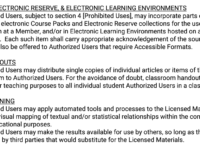Canadian copyright lobby groups have spent years falsely claiming that educational institutions refuse to pay for licences to compensate for the use of educational materials. This second post in my Fair Dealing Week series on Canadian copyright, fair dealing, and education focuses on this claim, which is a gross misrepresentation of the data (first post on Setting the Record Straight). The truth is that Canadian universities spend millions of dollars on licensing copyright materials. In fact, over the past decade, the emergence of site licenses that provide access to millions of works – books, journal articles, newspapers, and more – has led to huge increases in expenditures for access. Unlike copyright licences from copyright collectives such as Access Copyright, these digital licences provide both original access to works and the ability to use them in course materials. In the 1990s, a university would both purchase a book and pay for the right to copy a portion of it to distribute to students as course materials. Today, the university can use a single licence to gain access to the book and make it available as course material, handouts and for many other purposes since most digital licences facilitate access and permit multiple uses.
Archive for February 22nd, 2023

Law Bytes
Episode 210: Meredith Lilly on the Trade Risks Behind Canada’s Digital Services Tax and Mandated Streaming Payments
byMichael Geist

July 15, 2024
Michael Geist
June 24, 2024
Michael Geist
Search Results placeholder
Recent Posts
 The Law Bytes Podcast, Episode 210: Meredith Lilly on the Trade Risks Behind Canada’s Digital Services Tax and Mandated Streaming Payments
The Law Bytes Podcast, Episode 210: Meredith Lilly on the Trade Risks Behind Canada’s Digital Services Tax and Mandated Streaming Payments  Abandoning Institutional Neutrality: Why the University of Windsor Encampment Agreements Constrain Academic Freedom and Freedom of Expression
Abandoning Institutional Neutrality: Why the University of Windsor Encampment Agreements Constrain Academic Freedom and Freedom of Expression  The Law Bytes Podcast, Episode 209: Peter Menzies on Why the Canadian News Sector is Broken and How to Fix It
The Law Bytes Podcast, Episode 209: Peter Menzies on Why the Canadian News Sector is Broken and How to Fix It  Why the University of Windsor Encampment Agreement Violates Antisemitism and Academic Freedom Standards
Why the University of Windsor Encampment Agreement Violates Antisemitism and Academic Freedom Standards  Know When to Fold Em: The Big Risk Behind Canada’s Digital Services Tax Bet
Know When to Fold Em: The Big Risk Behind Canada’s Digital Services Tax Bet

